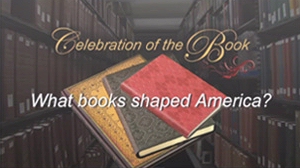
Last week I wrote about a list from the Library of Congress identifying “88 Books that Shaped America.” Yet nearly a third of the books aren’t even available in Amazon’s Kindle Store! Out of all the books ever written, these were the ones which had been selected as the most influential on the lives of Americans. So I created a list of the 29 “missing American classics,” and thought about what the list implies for the future of reading, and the way that we’ll relate to our past.
Some of the missing titles were just influential children’s picture books, like The Cat in the Hat, Goodnight Moon, The Snowy Day, and Where the Wild Things Are. (Though you could listen to these stories on your Kindle, as audiobooks!) But for some reason, the Kindle Store doesn’t seem to have a version of the longer children’s novel, Charlotte’s Web – either as an ebook or as an audiobook. And there’s even more influential “books for grown-ups” that seem to be missing from Amazon’s Kindle Store.
The two missing books that surprised me most were To Kill a Mockingbird and Catcher in the Rye. (Though some all-American entrepreneurs have apparently written ebooks about these books, just so that interested readers have something else to purchase.) When I went to high school, these books were both considered modern classics, yet you still can’t read them on your Kindle. I’ve heard theories that the aging authors of these two books are insisting that they’ll be made available only in printed form.
For some reason, Amazon’s Kindle Store only has a French-language version available for Benjamin Franklin’s influential 1751 study “Experiments and Observations on Electricity.” (And Streetcar Named Desire is available only as an audiobook, though you could also rent Marlon Brando’s famous movie version for your Kindle Fire tablet. ) But I also couldn’t find a complete copy of The Weary Blues, an influential collection of poetry by Langston Hughes. On the other hand, I’ve never heard of a few of the books on the list from the Library of Congress – like Peter Parley’s Universal History from 1836.
Some books may have had an influence in past centuries, while being almost completely forgotten by the 21st century. But does that mean that the books that we’re writing today will suffer the same obscurity. And is it possible that going forward, America will be shaped more by ebooks from amateur authors?
Maybe in the future, the Library of Congress will recognize 50 Shades of Gray as an influential ebook. Or The Mill River Recluse. Or at least John Locke’s How I Sold 1 Million eBooks in 5 Months…
29 “Books that Shaped America” That Aren’t in the Kindle Store
The American Woman’s Home by Catharine E. Beecher and Harriet Beecher Stowe (1869)
The Autobiography of Malcolm X Malcolm X and Alex Haley (1965)
The Cat in the Hat by Dr. Seuss (1957)
The Catcher in the Rye by J.D. Salinger (1951)
Charlotte’s Web by E.B. White (1952)
Experiments and Observations on Electricity by Benjamin Franklin (1751)
Goodnight Moon by Margaret Wise Brown (1947)
A Grammatical Institute of the English Language by Noah Webster (1783)
Howl by Allen Ginsberg (1956)
Idaho: A Guide in Word and Pictures by the Federal Writers’ Project (1937)
Joy of Cooking by Irma Rombauer (1931)
Mark, the Match Boy by Horatio Alger Jr. (1869)
McGuffey’s Newly Revised Eclectic Primer by William Holmes McGuffey (1836)
New Hampshire by Robert Frost (1923)
Our Town: A Play by Thornton Wilder (1938)
Peter Parley’s Universal History by Samuel Goodrich (1837)
Sexual Behavior in the Human Male by Alfred C. Kinsey (1948)
The Snowy Day by Ezra Jack Keats (1962)
Spring and All by William Carlos Williams (1923)
A Street in Bronzeville by Gwendolyn Brooks (1945)
A Streetcar Named Desire by Tennessee Williams (1947)
A Survey of the Roads of the United States of America by Christopher Colles (1789)
To Kill a Mockingbird by Harper Lee (1960)
A Treasury of American Folklore by Benjamin A. Botkin (1944)
Unsafe at Any Speed by Ralph Nader (1965)
The Weary Blues by Langston Hughes (1925)
Where the Wild Things Are by Maurice Sendak (1963)
The Words of Cesar Chavez by Cesar Chavez (2002)

